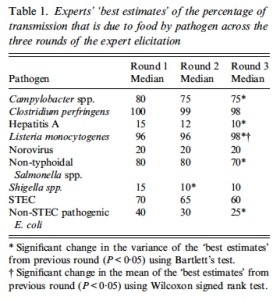Estimates of the proportion of illness transmitted by food for different enteric pathogens are essential for foodborne burden-of-disease studies. Owing to insufficient scientific data, a formal synthesis of expert opinion, an expert elicitation, is commonly used to produce such estimates.
 Eleven experts participated in an elicitation to estimate the proportion of illnesses due to food in Australia for nine pathogens over three rounds: first, based on their own knowledge alone; second, after being provided with systematic reviews of the literature and Australian data; and finally, at a workshop where experts reflected on the evidence.
Eleven experts participated in an elicitation to estimate the proportion of illnesses due to food in Australia for nine pathogens over three rounds: first, based on their own knowledge alone; second, after being provided with systematic reviews of the literature and Australian data; and finally, at a workshop where experts reflected on the evidence.
Estimates changed significantly across the three rounds (P = 0·002) as measured by analysis of variance. Following the workshop in round 3, estimates showed smoother distributions with significantly less variation for several pathogens. When estimates were combined to provide combined distributions for each pathogen, the width of these combined distributions reflected experts’ perceptions of the availability of evidence, with narrower intervals for pathogens for which evidence was judged to be strongest. Our findings show that the choice of expert elicitation process can significantly influence final estimates. Our structured process – and the workshop in particular – produced robust estimates and distributions appropriate for inclusion in burden-of-disease studies.
Evaluation of a structured expert elicitation estimating the proportion of illness acquired by foodborne transmission for nine enteric pathogens in Australia
Epidemiology and Infection, Volume 144, Issue 5, April 2016, pages 897-906, DOI: http://dx.doi.org/10.1017/S0950268815002435
Vally, K. Glass, L. Ford, G. Hall, M. D. Kirk, C. Shadbolt, M. G. K. Veitch, K. E. Fullerton, J. Musto, and N. Becker
